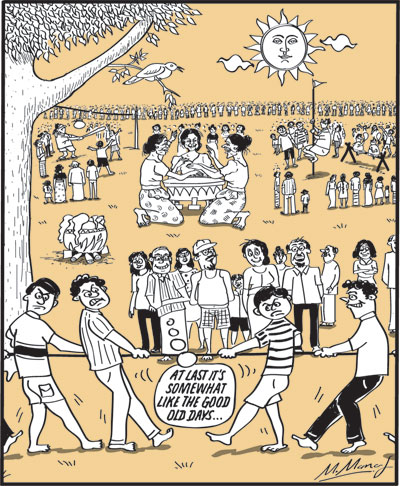Columns
Celebrating New Year at a time of economic recovery
View(s):Last week’s celebration of the Sinhala and Tamil New Year was more joyous than it had been in the three preceding years. There were distinct signs that the country had passed through its darkest and hardest times and was looking forward to happier days.
Lesser scarcities
This year’s celebration of the New Year with lesser scarcities of essentials than in the preceding three years, and the decrease in some prices, have evoked hopes of achieving a Subha Aluth Avuruddak (prosperous New Year).
Work ethic
However, for this to be realised, these wishes must be followed by a new work ethic that enhances the production of goods and services.
It is the duty and responsibility of the rulers to adopt and implement reforms that stabilise the econo-my and ensure its growth and development.
Corruption
Let us also hope that the New Year heralds a new era of lesser corruption that is widespread in the country and poses a serious impediment to economic growth.
Worst is over
The scarcities of essential items of food, fuel and drugs are over.
Although economic difficulties prevail, especially for the poor and unemployed, the worst is over.
External finances
The improvement in the external finances and the prospect of further improvement during the course of the year (discussed in my previous column) lend hope of increased employment, incomes, and lesser poverty, hunger and malnutrition.
Economic recovery
The current economic recovery is merely an easing in the availability of essential items and not one brought about by economic growth. In fact, production in all sectors has declined and this year would also be a year of economic contraction. The economy is expected to contract by a further 3 percent this year.
Improvement
What we are witnessing is essentially an improvement in the balance of payments and a further pro-spect of an improvement of it and external reserves.
Exogenous
The improved economic conditions have been brought about by exogenous factors: increased remit-tances from abroad and increased tourist earnings. These two sources are expected to contribute about US$ 8 to 9 billion and wipe out the trade deficit.
IMF
In addition, the International Monetary Fund’s (IMFs) Extended Finance Facility (EFF) is expected to bring in project assistance to boost the reserves, although the IMF’s first tranche of US$ 333 million is not of much significance.
Increasing production
Despite these inflows improving the external finances, the production capacity of the economy re-mains weak and below potential. All three sectors of the economy — agriculture, industry and services — are performing inadequately. Consequently, the economy is expected to contract by a further 3 percent this year, in addition to last year’s contraction of nearly 12 percent.
Reversal
The reversal of this trend to one of growth is vital and must begin immediately. Removal of raw mate-rial scarcities should assist in the recovery of manufactures. However, the revival of manufactured ex-ports is constrained by lesser export demand of our main manufactures. In addition, many industries have closed down owing to increased cost of production.
Agriculture
The availability of fertiliser and agrochemicals could revive agricultural production later this year. While the Maha paddy crop that has been harvested, is 30 to 40 percent below the average, a revival of the Yala crop is expected with the availability of fertiliser and agrochemicals.
Tea
Tea production that has been badly affected in the last two years by the unavailability of essential in-puts, could be expected to increase this year. However, rainfall is vital to ensure good harvests.
Mere recovery
These improvements in agricultural production are only recoveries from a disastrous policy of banning fertiliser and agrochemicals. In fact, these are fundamental problems in agriculture that require to be addressed to get agriculture moving.
Strategy
What is needed are a medium and long-term programme and a strategy to increase the production and productivity of food and cash crops. Next Sunday’s column discusses this in more detail.
Tourism
The growth of tourism and the availability of fuel and raw materials could witness a resurgence of sev-eral services. Peaceful conditions, industrial peace, and law and order are also vital for the resurgence of industrial production, tourism and other economic services.
Poverty
In spite of the easing of scarcities and availability of essentials, the incidence of poverty has increased. The burdens of the high cost of living and the plight of the increasing unemployed and those in abject poverty persist and need to be effectively addressed by the reform of safety nets.
The needy
Initial steps have been taken to devise methods of ensuring that the needy get relief and benefits and that they are not frittered away among the undeserving.
Unrealistic
Given the past experience of the Janasaviya and Samurdhi, one can expect only an improvement, not a resolution of the problem of the exclusion of the deserving and the unintended receiving the bene-fits.
Conclusion
Whether the New Year will herald a Subha Aluth Avuruddak does not lie in our stars. It depends, inter alia, on the pursuance of correct economic policies, implementing reforms, hard work, elimination of corruption and the maintenance of law and order.
Whether the New Year will turn out to be a Subha Aluth Avuruddak or not depends on our commit-ment to these values.
Buying or selling electronics has never been easier with the help of Hitad.lk! We, at Hitad.lk, hear your needs and endeavour to provide you with the perfect listings of electronics; because we have listings for nearly anything! Search for your favourite electronic items for sale on Hitad.lk today!


Leave a Reply
Post Comment